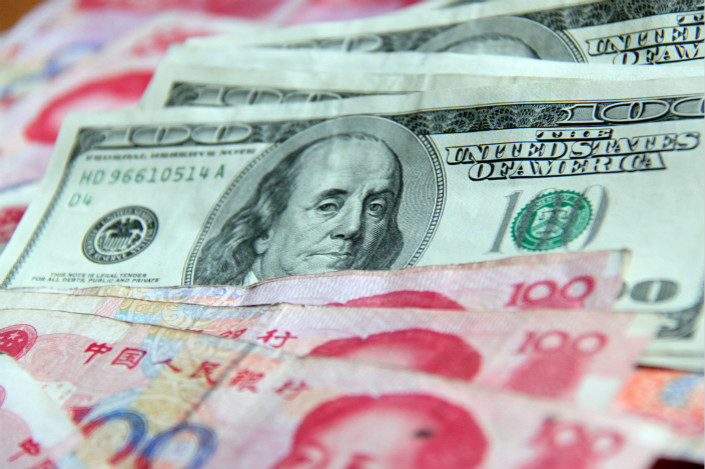Forex Watchdog Says External Debt Risks Under Control

China’s forex regulator said the country’s external debt risks are under control and it is working with the central bank to improve its management of cross-border financing, stepping up scrutiny over local government financing vehicles and real estate firms.
China’s total outstanding external debts (link in Chinese) amounted to $1.71 trillion at the end of December, data from the State Administration of Foreign Exchange (SAFE) showed, up by $294.8 billion from the same period a year ago. Long-term foreign debt amounted to $611.6 billion, making up 36% of China’s total external liabilities, while short-term debts accounted for 64%. Banks’ outstanding debts made up 49% of the total, while 10% came from government liabilities.
The two factors that drove last year’s external debt growth were increases in deposits from foreign financial institutions, and foreign institutions’ increasing purchases of bonds, with their contribution to the overall expansion of external debt reaching 42% and 37% respectively, Wang Chunying, head of SAFE’s Balance of Payments Department, said during a briefing Thursday.
Wang said that growth of external debt in the form of bonds shows that foreign investors have become more interested in the increasingly liberalized interbank bond market. In particular, the bond connect between the mainland and Hong Kong has provided foreign investors with wider access to the domestic financial market, arousing foreign institutions’ interest in holding more Chinese bonds.
At the end of 2017, the liability ratio, or the ratio of outstanding external debt to gross domestic product, was 14%, well below the internationally accepted safe level, Wang said.
Wang said SAFE is working with the central bank to improve its macro-prudential management of cross-border financing in order to make the most of its anti-cyclical adjusting functions and keep the overall risk of external debts in check.
The forex regulator has already stepped up its control over the external borrowing of “key areas and industries,” stipulating that real estate firms and local government financial vehicles are not allowed to raise funds from abroad without special permission, and that banks and other financial service institutions such as securities firms need special approval for settlement of foreign exchange under their external debt.
Contact reporter Pan Che (chepan@caixin.com)

- 1Cover Story: China Carves Out a Narrow Path for Offshore Asset Tokenization
- 2Drownings Shake Chinese Enthusiasm for Travel to Russia
- 3Over Half of China’s Provinces Cut Revenue Targets
- 4Li Ka-Shing’s Port Empire Hit by Forced Takeover Amid Panama Legal Dispute
- 5In Depth: China’s Mutual Fund Industry Faces Overhaul After a Banner 2025
- 1Power To The People: Pintec Serves A Booming Consumer Class
- 2Largest hotel group in Europe accepts UnionPay
- 3UnionPay mobile QuickPass debuts in Hong Kong
- 4UnionPay International launches premium catering privilege U Dining Collection
- 5UnionPay International’s U Plan has covered over 1600 stores overseas



